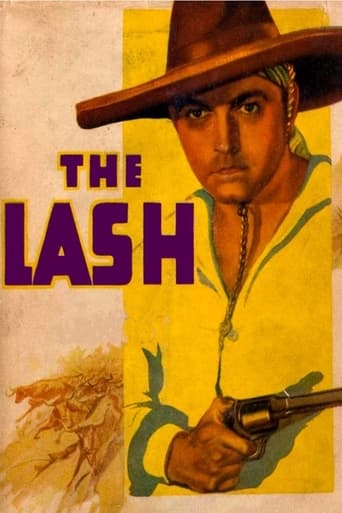drjgardner
When you watch some films from the early talkie period you have to realize that film was in a transitional period. Of course, not all films from this period need that caveat: look at the wonderful films like "All Quiet on the Western Front", "Animal Crackers", "Disraeli", "The Big House", etc. Unfortunately, "The Lash" requires the caveat. It's OK considering the time when it was made.The film's star is Richard Barthlemess (1895-1963) who was a major silent film star but failed to make the transition due to his acting style, which is well illustrated here. Director Frank Lloyd (1886-1960) who was a major figure in the 30s, seems to be on holiday here. Llolyd was nominated for an Oscar 4 times and won for "The Divine Lady" (1929) and "Cavalcade" (1933). Among his notable films are "Mutiny on the Bounty" (1935), "Blood on the Sun" (1945), and my favorite Jim Bowie biography "The Last Command" (1955). But here his considerable skills are not on display.I think the problem was wider spread than this film. Westerns did poorly for many years, and only found their depth in the 40s and 50s.
MartinHafer
Richard Barthelmess was a fine and rather diminutive actor....but not appropriate for this film. After all, he's supposed to play a Hispanic man and seems about as Hispanic as Chop Suey! Now I am not saying the part could not have been played competently by an Anglo actor--heck, Warner Baxter very ably played The Cisco Kid during this era. But with no accent and very waspy boy next door looks and manners, Barthelmess is simply wrong for such a part. The same is true of many of the supporting cast as well, such as the Mexican-American ladies played by Mary Astor and Marian Nixon! Why they didn't employ Mexican actors is a puzzler...as well as why they didn't even try to make these folks seem Mexican. The film begins soon after the Mexicans were forced to cede California to the United States after the Mexican War. Pancho has been off to school in Mexico City and he's returning to his family ranch in California when he's introduced to the prejudices the Americans have for their new Mexican-American brothers and sisters. For instance, in one town speaking Spanish is banned...which shouldn't pose any problem to Pancho (I think speaking Spanish would have been a much bigger problem for him)! Soon, a local thug is beating up Pancho and some other poor sap...simply because they are Mexican by birth. Eventually, the mistreatment becomes so bad that Pancho decides to become a Zorro-like hero named 'El Puma' and delivers justice to those jerks! What does he do and where does it all go? See the film and find out for yourself.This film looks and sounds very dated. Despite some really nice sets (including a nice looking replica of el Bosque de Chapultapec at the end of the film), the entire production is dull, stagy and the dialog is amazingly old fashioned. Because of this, the love scenes come off (unintentionally) as comedy and the entire film is a chore to watch. The poor print sure didn't help but is the least of the film's problems.
bkoganbing
Though Richard Barthelmess gives a good account of himself as Hispanic Californio post Mexican War, I wonder why someone like Gilbert Roland was not cast in the part. He would have been perfect in The Lash.The Lash has Richard Barthelmess returning home to his California ranch after service in the Mexican army during the war. All is not well at his place as some of the Americans are proving to be ruthless conquerors. One who especially fits that bill is Fred Kohler, a very greedy and crooked land commissioner.After a few indignities at the hands of the Americans, Barthelmess turns to outlawry and takes up the name of El Puma. Essentially he's Zorro without the mask. And he's won the heart with his dashing derring-do of Senorita Mary Astor.On the minus side he's causing a lot of conflict for his sister Marian Nixon and James Rennie who is the new American sheriff, but an honest one. Barthelmess was still a bit uneasy before the sound camera and it certainly would have been a better film had someone of Latino background been cast. But on balance The Lash is good entertainment.Though a pair of non-Latinos like Errol Flynn and Tyrone Power were waiting in the future for these kind of roles.
Jay Phelps
This film is very well crafted for an early talkie from 1930. Unlike so many stage-locked productions of this time, the film takes advantage of the rustic California settings of old California. There are few long static takes with people standing around the hidden microphone. Beautifully photographed, the shots change often and the camera movement is fluid throughout. (Makes you wonder what director Tod Browning's excuse was for painfully static "Dracua".) The outside scenes start the film out at a good pace. However, once the obligatory and talky love story kicks in, the story slows down to a crawl. Perhaps as off-putting is the poor quality of the print being shown on TMC. "The Lash" has clearly not been restored or cleaned, pock-marked throughout and with such deep contrast that some scenes are tough to make out. Towards the end of each reel, the film noise is so loud it almost drowns out dialog and music. This would be a film for a fan of early talkies to check out, but otherwise, it might be a tough go.


